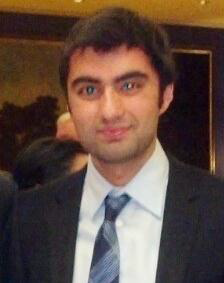Fahad Ahsan, Youth Leadership Grant Recipient
Fahad Ahsan, 2009-2010 Grant and 2010-2011 Matching Grant Recipient
Glenelg Country School (graduated 2011)
George Washington University
Ecuadent, and Special Education and Training Centre in Pakistan
Summary
 Fahad Ahsan initially raised over $2,600 for Ecuadent, an organization which funds the repair of facial birth defects in Ecuador. In the summer of 2010, a disastrous flood struck his parent’s homeland of Pakistan, so he focused his efforts on aiding the country by raising money for The Special Education and Training Centre in Lahore, Pakistan. As a college student, Fahad has pursued his interest in international affairs in academic and non-academic ways. He writes articles for Pakistani newspapers The News and The Nation, in which he addresses current events pertaining to Pakistan, the United States, and the greater Middle East.
Fahad Ahsan initially raised over $2,600 for Ecuadent, an organization which funds the repair of facial birth defects in Ecuador. In the summer of 2010, a disastrous flood struck his parent’s homeland of Pakistan, so he focused his efforts on aiding the country by raising money for The Special Education and Training Centre in Lahore, Pakistan. As a college student, Fahad has pursued his interest in international affairs in academic and non-academic ways. He writes articles for Pakistani newspapers The News and The Nation, in which he addresses current events pertaining to Pakistan, the United States, and the greater Middle East.
Project Update
Last year, I wrote in the Peace Essay contest and applied for a micro grant to benefit Ecuadent. This Maryland-based organization raises money and sends medical specialists to Ecuador every year to surgically repair people’s birth defects. Supporting this cause directly correlated with the theme of compassion because I had a first-hand experience seeing the dehumanization of a child with a facial disfigurement. Including the micro-grant, I raised over $2,600 in 2010 for this cause. In the summer of 2010, disastrous floods struck my parent’s homeland of Pakistan, so I turned my efforts toward raising money for displaced Pakistanis. This year, I have already raised more than $1000 at our school’s Annual Fashion Show and Benefit Gala for a school in Lahore, Pakistan that educates and houses thousands of impoverished students. Therefore, the matching grant will be donated to The Special Education and Training Centre in Lahore.
Ecuadent project summary
I have already raised money for Ecuadent, the Maryland based organization that funds these operations. Every year they send a team of surgeons, dentists, and other experts to Ecuador. They travel to Ecuador’s most remote villages and towns to provide assistance. Ecuador is the poorest country in South America and thousands of its children suffer from birth deformities. These deformities not only cause physical damage to the children of Ecuador, but they have a traumatic psychological effect as well. These children cannot live normal lives as people often refuse to even look at them. Sadly, this condition damages a child’s self-esteem, social skills, and behavior. As a result, social development for these children occurs very slowly. This condition is catastrophic in a country afflicted with a 40% poverty rate. The only way to deal with this problem is by demonstrating compassion. Since children with clefts are deprived of humanity, it is a human responsibility to return it back to them through these operations. Every surgery, which costs a couple hundred dollars each, changes the life of one child forever. Through my study of Abrahmic traditions, and their respective attitudes towards compassion and charity, the most effective form of charity is to aid individuals to the extent that they become self-sufficient. The most important aspect of self-sufficiency is self-confidence; and there is no better way to provide these children with self-confidence than to give them back their smiles.
Reflection
Participating in this year’s [2009-2010] essay contest helped me understand the significance of compassion. My perception on the meaning of compassion has changed. In my essay, I differentiated between compassionate charity, and self-interest oriented charity. Each of the Abrahamic Faiths define compassionate charities through their three Messengers, respectively. However, the most powerful idea of my essay was what I interpreted as the greatest form of compassion: to make a permanent difference in a helpless person’s life. This idea motivated me to consider Operation Smile, a project that pays for surgical operations of children with cleft, as my project to demonstrate compassion.
